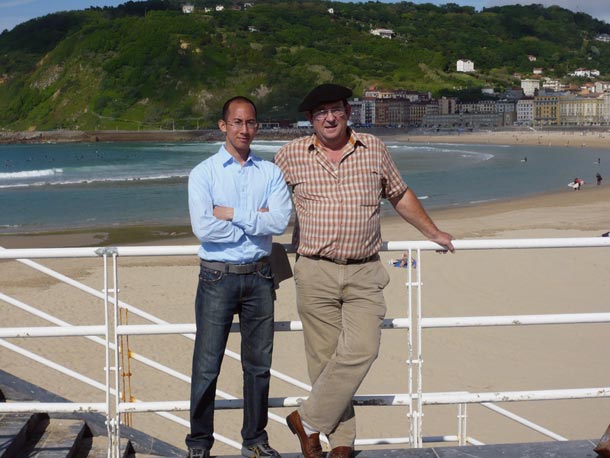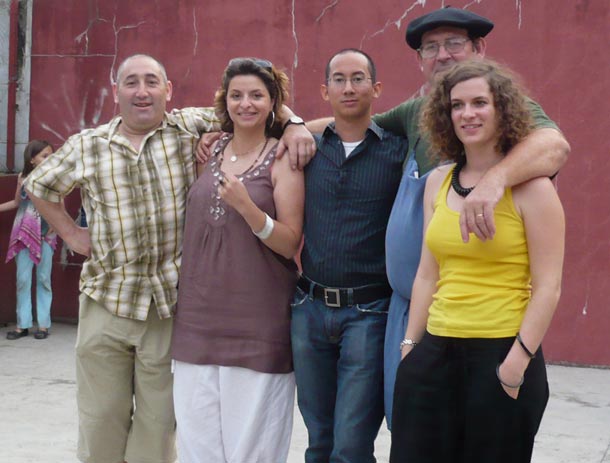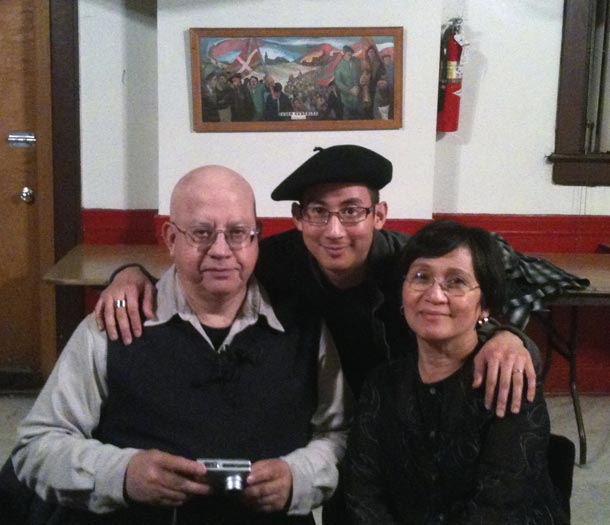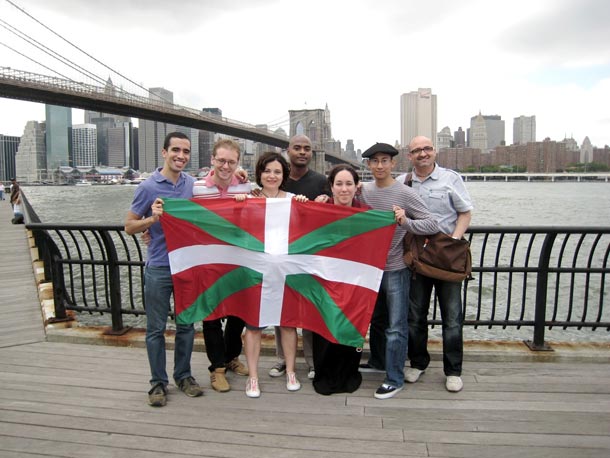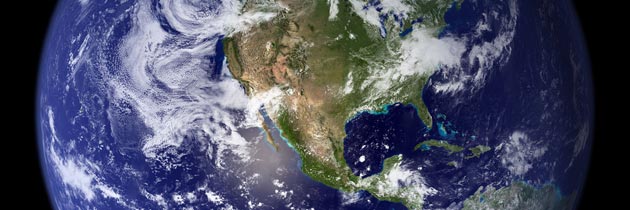
KOSMOpolita
Circling Back to Euskal Herria
The concept of identity was very strange to me growing up as a child. As a multi-ethnic first generation American, my childhood upbringing was not centered on the Filipino heritage of my mother or that of Guatemalan father. My family only spoke English at home so my knowledge of Tagalog and Spanish were limited to a smattering of words and phrases. I did, however, continue to learn Spanish in grade school. So there I was, a little boy with Asian eyes who had a Spanish first and middle name, and a mysterious last name with too many letter As, a last name whose meaning remained unknown for most my life and that of my father’s.
In early 2002 I was in South India working on an archaeological survey project at Vijayanagara, the capital of the last Hindu empire dating from the 14th-16th centuries. The year before, I completed my undergraduate degree at Pratt Institute, a school for art and design in New York City. My concentration was in Interactive Media and Computer Graphics and for several years, I designed and developed web sites for clients of various industries.
José Antonio Alcayaga III and Manolo Alcayaga Goikoetxea.
Donostia-San Sebastián, June 2008.
While completing field work at Vijayanagara I received a brief but profound e-mail that would later influence my path of self-discovery. It was from a man named Manolo Alcayaga Goikoetxea stating that he was in contact with my father and was constructing his family tree. Manolo introduced himself along with Marisol Alcayaga Garmendia, two distant cousins dedicated to researching our family history and disseminating the information to relatives around the world. According to Manolo, Marisol had been writing a book about the history of the Alcayaga family for several years.
In the e-mail, Manolo revealed to me the meaning of the Alcayaga name, which is the Latinized form of Alkaiaga. In Euskara, the suffix -aga means “place of ” and that alka refers to a grass known as “txistu-belar” which literally means “grass that whistles” when it is cut. Children often make a whistling sound with a blade of this grass by holding it between two thumbs and blowing. He mentioned that in Poland this grass is often called “Bison Grass”. The name Alkaiaga therefore signifies a “place where the whistling grass is found”. This aligns with the fact that most Basque surnames are toponyms, or names derived from places or geographic features.
Alcayagas from Iparralde, Chile and United States.
Behobia, Lapurdi, June 2008.
It wasn’t until early 2008 when I sat in front of a computer at work day-dreaming about my next adventure that my Basque heritage re-entered into my consciousness. Freelance web consulting allowed me to work with different clients and project lengths and most importantly, granted me the ability to decide when I wanted to take time off. I have always pursued cultural and intellectual interests and this time I turned my attention towards my own identity. If I knew who my ancestors were I would have a better understanding of who I was and who I would become. I knew that my name was Basque, but I wasn’t aware of what that really meant. I decided that I wanted to travel to the Basque region to learn about the culture and the language of my ancestors and to reconnect with the Alcayagas currently living there. Before I did this I needed to find a way to share my discovery with other Alcayagas.
That Spring I joined the social networking web site, Facebook, and created the group “Alcayagas of the World” with the intent to unite all those who share the Alcayaga name and to provide a forum for discussing our common ancestry. Currently the group has approximately 930 members from various parts of North and South America, Europe and Asia. The discussion board and “wall” reveal that relatives who have never met are meeting one another for the first time. In many of the posts, the members list the names of their parents and grandparents along with their city and country of origin. It was an honor to inform Alcayagas from all over the world about their Basque surname and this new connection to a world they did not know existed. The idea of having a family reunion on the physical level has been mentioned in various occasions. The first family reunion for the Alcayagas of the Basque Country was organized by Manolo and Marisol in 2002. Relatives from both sides of the Bidasoa River who lived in close proximity were unaware that they were closely related to one another.
José with parents at the Euzko-Etxea of New York.
Brooklyn, New York, January 2010.
A forum for the greater Alcayaga family was set up on Facebook and like my ancestors that left the Basque Country 450 years ago to sail to the Americas, I was ready to return to the homeland. Through the University of Nevada’s USAC (University Studies Abroad Consortium) program, I enrolled in Basque culture and grammar courses at the University of the Basque Country in Donostia-San Sebastian. Also for the first time I met with Manolo and Marisol, my distant relatives who opened my eyes to my Basque heritage. Camera in hand, I documented my Basque experience. I shared a meal at a txoko (gastronomic society), visited the Saturday morning market in Tolosa, hiked Mount Jaizkibel, watched a stone-lifting competition, and enjoyed the festivities of San Juan and San Marciales. Most recently I exhibited several of my photographs of the Basque Country in a show titled Art on the Avenue, an annual spring arts festival in Greenwich, Connecticut, United States.
During one of my visits to Manolo’s home in Hendaia, a framed family tree that hung on the wall of his living room caught my eye. It was a family tree of the Alcayaga lineage dating back to the 14th century in Irun/Hondarribia. On the bottom left, there was a branch for Guatemala that dates back to the 1550s. This branch represented the Alcayagas that took part on the first expeditions to the Americas. On the bottom right, there was a branch for Chile which led up to one of our most famous relatives, Gabriela Mistral. Gabriela Mistral is the pseudonym for Lucila Godoy y Alcayaga, a poet, educator, diplomat, and feminist who was the first Latin American to win the Nobel Prize in Literature in 1945.
Members and friends of the Euzko-Etxea of New York.
Juan Antonio Mogel reading.
Brooklyn, New York, June 2009.
I had my Alcayaga Facebook group, but I felt the need to continue connecting the Basque Diaspora. In the fall of 2008 I organized the first Basque Language and Culture Meetup on Meetup.com, a web site that helps groups of people connect in cities around the world. Members in my group get together in New York City once or twice a month to socialize and celebrate Basque heritage. We have enjoyed dinners at the Euzko-Etxea of New York, attended a literary reading, and experienced Basque wine tasting and art exhibits. There are currently 29 members most of whom live in the New York, New Jersey, and Connecticut areas. Throughout my journey I have used the internet to connect generations of Alcayagas from the Diaspora, educating them about their Basque heritage and inspiring them to seek out family connections within their host countries. My hope is that by creating community online and offline, I will inspire others to look within to discover their heritage and celebrate it with others.
Back in 2008 as I stood at the port of Pasajes San Juan, known as Donibane in Euskara, I imagined the ships that my ancestors boarded for their voyage to the Americas. I had found what I was looking for. Upon returning the United States, from that moment forward, I had a renewed sense of self. When someone asks me about my ethnicity, I refer to myself as Basque, Guatemalan and Filipino. To me identity is discovering ancestry and celebrating it in the present moment. I identify with being Basque because of what it represents: hard work, brevity independence, innovation, and I am not ashamed to say, stubbornness. Throughout my life I have exemplified these traits and now I knew where they came from. Circling back to Euskal Herria has inspired me to create community through genealogy and ancestry by blending both the online and offline world. In the near future I hope to pursue graduate studies in the field of anthropology.


